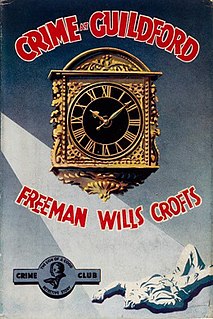
Crime at Guildford is a 1935 detective novel by the writer Freeman Wills Crofts. Crofts was a leading figure of the Golden Age of Detective Fiction and often set his novels in Surrey where he lived close to Guildford. It was the thirteenth in a series of novels featuring Inspector French. It was published in America by Dodd Mead under the alternative title The Crime at Nornes.

The Sea Mystery is a 1928 detective novel by Freeman Wills Crofts. It is the fourth in a series of novels featuring Inspector French of Scotland Yard. As with a number of his works Crofts creates a puzzling mystery which French is then able to solve using a Tide table and Bradshaw's Guide to the railways. The plot has some similarities with his debut novel The Cask (1920).

The Cask is a 1920 detective novel by the Irish-born writer Freeman Wills Crofts. His debut novel, it is considered his masterpiece. Long after the author's reputation had declined, this book was still hailed by critics as a cornerstone of the genre Crofts had been working as a railway engineer before writing the novel, but its success launched him as one of the leading writers of the Golden Age of Detective Fiction. He later went on to create the character of Inspector French of Scotland Yard who appeared in a long-running series of novels.

The Groote Park Murder is a 1923 detective novel by Freeman Wills Crofts, one of the leading figures of the Golden Age of Detective Fiction. It was one of several stand-alone novels Crofts wrote following his successful debut The Cask, before creating the character of Chief Inspector French who debuted the following year in Inspector French's Greatest Case.
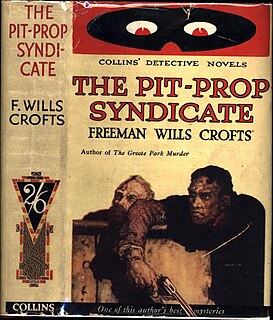
The Pit-Prop Syndicate is a 1922 thriller novel by Freeman Wills Crofts, one of the leading figures of the Golden Age of Detective Fiction. It was one of several stand-alone novels Crofts wrote following his successful debut The Cask, before creating the character of Inspector French who debuted in Inspector French's Greatest Case (1924).

Enemy Unseen is a 1945 detective novel by Freeman Wills Crofts. It is the twenty fifth in his series of novels featuring Chief Inspector French, a prominent figure of the Golden Age of Detective Fiction. A review by Anthony Boucher in the San Francisco Chronicle noted it was "For the patient only, but for them a rewarding treasure."
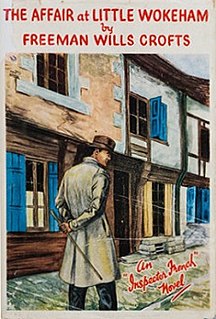
The Affair at Little Wokeham is a 1943 detective novel by the Irish writer Freeman Wills Crofts. It is the twenty fourth in his series of novels featuring Inspector French, a prominent figure of the Golden Age of Detective Fiction. It was published in the United States under the alternative title of Double Tragedy.

Fear Comes to Chalfont is a 1942 detective novel by the Irish writer Freeman Wills Crofts. It is the twenty third in his series of novels featuring Inspector French, a prominent figure of the Golden Age of Detective Fiction. Like much of the author's work it combines a traditional mystery with a police procedural.

Antidote to Venom is a 1938 detective novel by the Irish-born novelist Freeman Wills Crofts. It is the eighteenth in his series of novels featuring Inspector French, a Scotland Yard detective known for his methodical technique. It was reissued in 2015 by the British Library Publishing as part of a group of crime novels from the Golden Age of Detective Fiction.
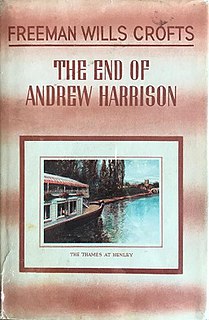
The End of Andrew Harrison is a 1938 detective novel by Freeman Wills Crofts. It is the seventeenth in his series of novels featuring Inspector French, a Scotland Yard detective of the Golden Age known for his methodical technique. The title character closely resembles Sigsbee Manderson, the murder victim of E.C. Bentley's celebrated 1913 novel Trent's Last Case.

The Box Office Murders is a 1929 detective novel by the Irish-born writer Freeman Wills Crofts. It is the fifth in his series of novels featuring Inspector French, a prominent figure of the Golden Age of Detective Fiction. It was published in the United States the same year by Harper under the alternative title The Purple Sickle Murders.

Golden Ashes is a 1940 detective novel by the Irish writer Freeman Wills Crofts. It is the twentieth in his series of novels featuring Inspector French, a prominent investigator of the Golden Age of Detective Fiction.

Hendon's First Case is a 1935 detective novel by John Rhode, the pen name of the British writer Cecil Street. It is the twenty first in his long-running series of novels featuring Lancelot Priestley, a Golden Age armchair detective. The novel introduced the character Inspector Jimmie Waghorn, a graduate of the newly established Hendon Police College. Over time Waghorn would increasingly become the dominant figure of the series, taking over the role from Priestley who took up a smaller, advisory role.
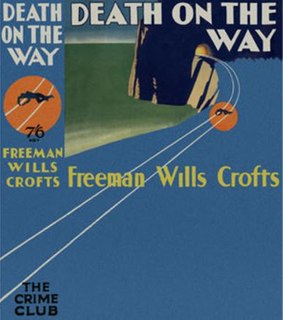
Death on the Way is a 1932 detective novel by the Irish writer Freeman Wills Crofts. It is the ninth in his series of novels featuring Inspector French, a prominent figure of the Golden Age of Detective Fiction. It was published in the United States the same year by Harper under the alternative title Double Death.
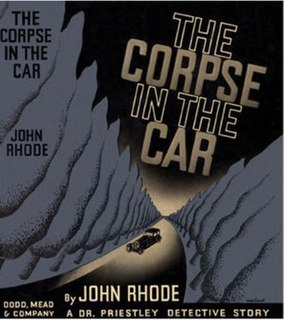
The Corpse in the Car is a 1935 detective novel by John Rhode, the pen name of the British writer Cecil Street. It is the twentieth in his long-running series of novels featuring Lancelot Priestley, a Golden Age armchair detective. A review by Ralph Partridge in the New Statesman commented "Mr. Rhode has written a humdrum, workaday book in The Corpse in the Car. He belongs to the English school of Freeman Wills Crofts, with which it is impossible to find technical fault." In The Spectator Rupert Hart-Davis considered that "The Corpse in the Car is greatly inferior to his last book, Shot at Dawn."

Anything to Declare? is a 1957 detective novel by Freeman Wills Crofts. It is the twenty ninth and final entry in his series of novels featuring Inspector French, a prominent figure of the Golden Age of Detective Fiction. The author had been in poor health for much of the decade, and struggled to finish this book which was published a few weeks before his death.

French Strikes Oil is a 1951 detective novel by the Irish-born writer Freeman Wills Crofts. It is the twenty eighth and penultimate entry in his series of novels featuring Inspector French, a Scotland Yard detective of the Golden Age known for his methodical technique. It was published in the United States by Dodd Mead under the alternative title of Dark Journey.
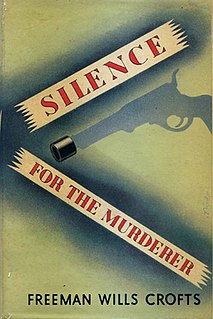
Silence for the Murderer is a 1949 detective novel by the writer Freeman Wills Crofts. It is the twenty seventh entry in his series of novels featuring Inspector French, a Scotland Yard detective of the Golden Age known for his methodical technique. The book attempt to create more complex characterisation than was usual in the series.
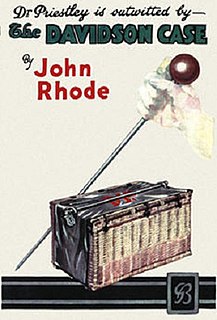
The Davidson Case is a 1929 detective novel by John Rhode, the pen name of the British writer Cecil Street. It was the seventh appearance of the armchair detective Lancelot Priestley, who featured in a long-running series of novels during the Golden Age of Detective Fiction.

Death on the Boat Train is a 1940 detective novel by John Rhode, the pen name of the British writer Cecil Street. It is the thirty second in his long-running series of novels featuring Lancelot Priestley, a Golden Age armchair detective. As in most of the later novels much of the detective footwork is done by Inspector Waghorn of Scotland Yard. The construction of the murder setting bears similarities to Death in the Tunnel, written by Street under his other pen name Miles Burton. With is focus on seemingly unbreakable alibis and railway and ship timetables, it is also similar in style to the Inspector French novels of Freeman Wills Crofts.




















